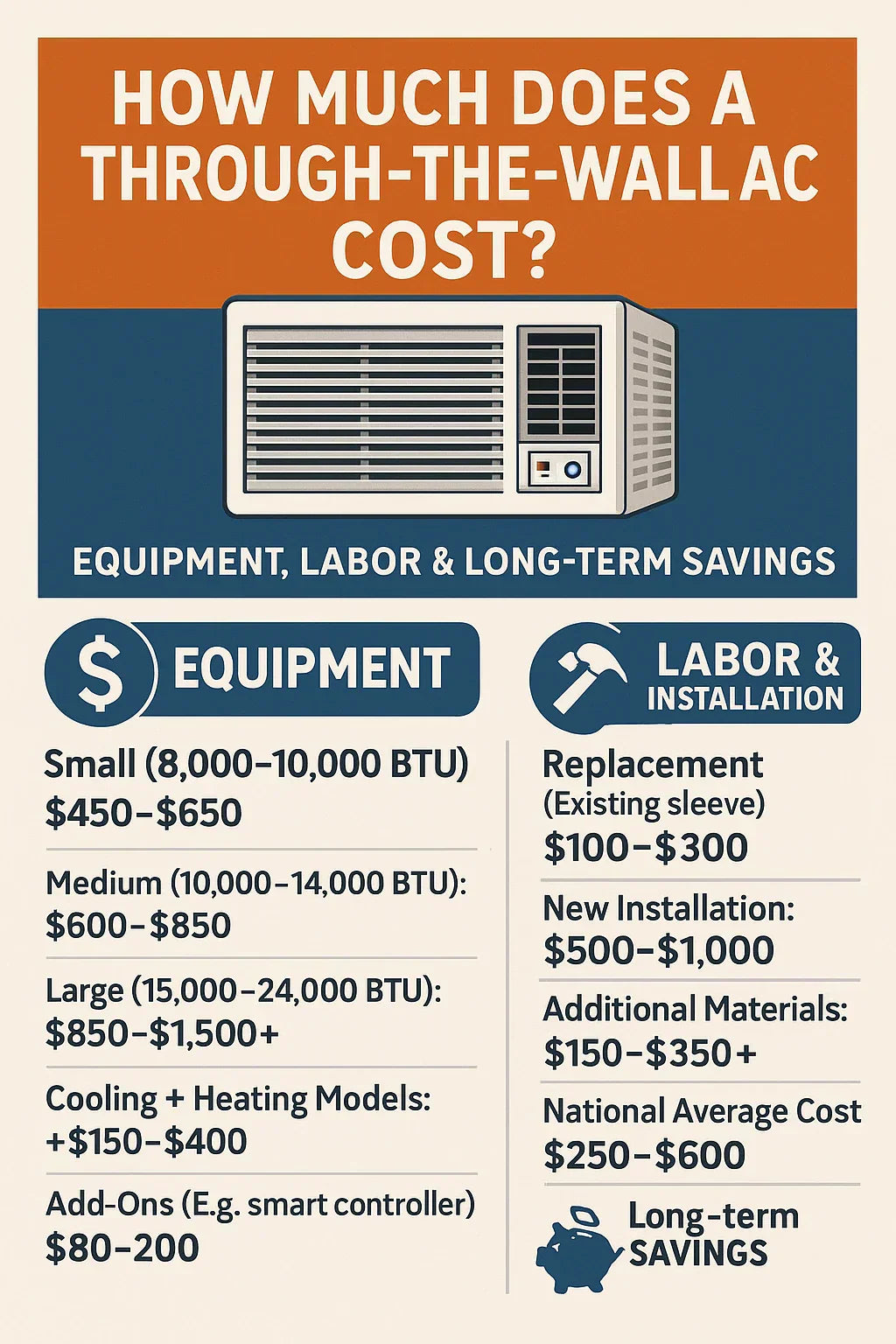📋 1. Introduction: Why the Full Cost Picture Matters
Buying a through-the-wall air conditioner isn’t a one-line budget item — it’s an investment that combines equipment price, installation labor, and long-term running costs. Many buyers make the mistake of only comparing sticker prices, without factoring in:
-
Energy efficiency (which impacts utility bills).
-
Installation requirements (new install vs. replacement).
-
Expected lifespan and maintenance costs.
This guide covers everything you need to know so you can make a fully informed choice — including realistic U.S. price ranges, brand comparisons, cost calculators, and potential long-term savings.
🏷 2. Equipment Costs: The Heart of Your Investment
The unit itself is the core expense. Your cost will vary depending on BTU size, brand reputation, and extra features.
🔢 a. Price by BTU Size
| BTU Size | Room Size (Sq. Ft.) | Typical Price Range |
|---|---|---|
| 8,000–10,000 | 300–450 | $450–$650 |
| 10,000–14,000 | 450–650 | $600–$850 |
| 15,000–24,000 | 650–1,500 | $850–$1,500+ |
💡 Savvy Tip: Use Energy.gov’s BTU sizing chart to avoid oversizing, which wastes energy and costs more upfront.
🏢 b. Price by Brand
-
Budget Brands (GE, Frigidaire): $450–$700
-
Mid-Range (LG, Amana): $600–$900
-
Premium (Friedrich, Midea Premier): $900–$1,500+
Budget models work well for occasional use, but premium units often last longer, run quieter, and offer better efficiency ratings.
🔥 c. Cooling + Heating Models
Units with heat pump or electric resistance heating cost $150–$400 more than cooling-only models. They’re ideal for year-round climate control, especially in moderate winters.
🛠 3. Labor & Installation Costs: The Hidden Variable
Installation costs can vary more than equipment prices, depending on whether you’re doing a new install or a replacement.
🆕 a. New Installation
If your home doesn’t have a wall opening:
-
Labor: $500–$1,000
-
Tasks: Cutting the wall, installing a wall sleeve, sealing, possible electrical upgrades.
♻ b. Replacement
If you already have a compatible wall sleeve:
-
Labor: $100–$300
-
Tasks: Removing old unit, inserting new one, minor adjustments.
⏱ c. Hourly Labor Rates
-
HVAC Technician: $75–$125/hour
-
General Contractor/Handyman: $50–$100/hour
📦 d. Additional Materials
| Material | Price Range |
|---|---|
| Wall Sleeve | $100–$250 |
| Decorative Grille | $50–$150 |
| Insulation & Seals | $10–$50 |
| Support Brackets | $30–$75 |
🌎 e. Regional Cost Variations
-
High-cost cities like New York or San Francisco: 20–30% higher labor rates.
-
Rural areas: Lower labor rates, but fewer product choices..
➕ 4. Optional Add-On Costs: Comfort & Protection
While not strictly necessary, accessories can boost performance, convenience, and longevity.
| Accessory | Function | Price Range |
|---|---|---|
| Smart Wi-Fi Controller | Remote operation & scheduling | $80–$200 |
| Surge Protector | Prevents electrical damage | $15–$40 |
| Winter Cover | Protects unit in off-season | $20–$60 |
| High-Efficiency Filter | Improves air quality | $10–$30 |
| Decorative Grille | Enhances aesthetics | $50–$150 |
⚡ 5. Long-Term Operating Costs: What You’ll Pay Every Year
A through-the-wall AC’s energy efficiency rating (EER or CEER) directly affects your utility bills.
📐 a. Annual Electricity Cost Formula
Example:
-
12,000 BTU unit
-
EER 10.5
-
8 hours/day for 90 days/year
-
$0.15/kWh electricity rate
You can confirm your own calculation using Energy.gov’s appliance energy calculator.
🧹 b. Maintenance Costs
-
DIY: Filter cleaning and coil cleaning — near zero cost.
-
Professional: Annual service $75–$150.
📆 c. Lifespan Expectations
-
Budget Models: 8–10 years
-
Premium Models: 12–15 years
💡 6. Long-Term Savings Opportunities
🎯 a. ENERGY STAR Rebates
Many utilities offer $30–$100 back for qualifying models.
Search ENERGY STAR’s rebate finder for local offers.
📉 b. Lower Energy Bills
Upgrading from an older EER 8 unit to EER 10.5 can save $25–$40/year in electricity.
🛡 c. Preventive Maintenance
Keeping coils clean and filters replaced can prevent 15–20% performance loss — a key factor in avoiding premature replacement.
📊 7. Cost Comparison Table
| Category | Budget | Mid-Range | Premium |
|---|---|---|---|
| Unit Price | $450–$650 | $650–$900 | $900–$1,500+ |
| Installation | $100–$300 | $250–$600 | $500–$1,000 |
| Add-Ons | $30–$100 | $80–$200 | $150–$400 |
| Total Installed Cost | $580–$1,050 | $980–$1,700 | $1,550–$2,900 |
📌 8. Final Recommendations
-
Replacing an old unit? Mid-range models often provide the best mix of cost and efficiency.
-
Installing in a high-use area? Premium units are worth it for longevity and noise control.
-
On a tight budget? Budget units plus a surge protector and insulation upgrades can still deliver reliable comfort.
Savvy Rule: Spend more upfront if you plan to use the unit heavily for 8+ years — efficiency savings will offset the initial cost.
In the Next topic we will read more about: Best Through-the-Wall AC Units in 2025: Top Picks for Performance, Price & Features







